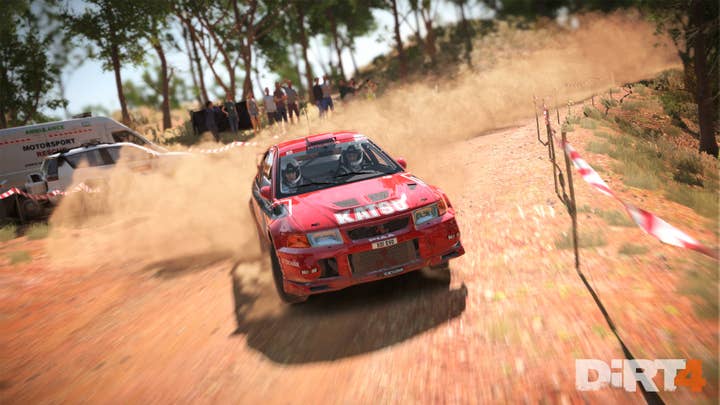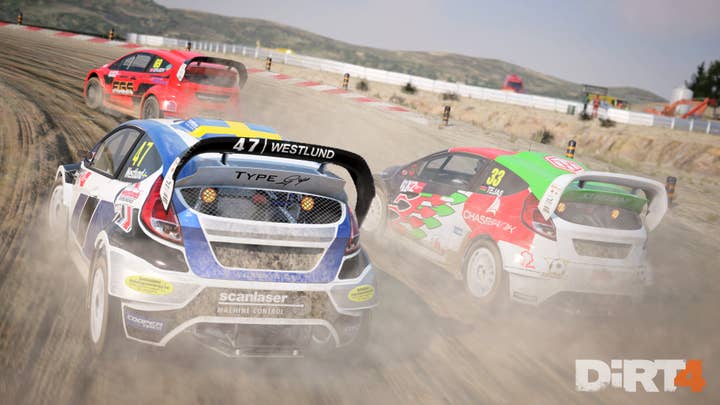“It's better than it's ever been at Codemasters”
The UK studio talks Dirt 4, the unpredictable racing genre and concerns over VR
It's not been a comfortable decade for employees of UK racing studio Codemasters.
As a developer, it's frequently beset with (not always unfounded) rumours that it is a business in trouble. It's also gone through a seemingly endless journey of growth, decline and re-structuring, as it focuses its efforts upon a genre that's nothing if unpredictable.
The movement from PS3 and 360 to PS4 and Xbox One was particularly painful for the firm.
Yet, over the past 12 months, the headlines circling the Warwickshire-based company has made for far more pleasant reading.
Last year, CEO Frank Sagnier announced that the cutting was over and that Codemasters posted its first profit in half a decade. The firm had also acquired the studio behind Driveclub (the developer formerly known as Evolution), which is currently creating an as-yet-untitled racing project. It then finished the year with its new F1 game, which sold significantly better than its predecessor.

"It is better than it has ever been," says chief game designer Paul Coleman. "I joined Codemasters in 2003, and we were making big games then, don't get me wrong, but there was still a small company mentality to it. When the Darling brothers sold the company, we went big and then had to shrink back down again. That has happened a few times. But this feels like we are in a much stronger position. The products that we are making are much more focused and are of a higher quality. Even things like having a gym on site is great. Staff have these facilities available to them, whereas previously we would just do our hours and go home. The vibe is much better now, and it feels like it's all coming together. There is that sense that we are going places as a company. Whereas before we had lost that."
Codemasters has started 2017 with a flurry of new project announcements. This included the return of Micro Machines to consoles (following its mobile debut last year), where the studio will hope to capitalise on the recent wave of 1990s nostalgia that's gripping the entertainment industry.
"I played a lot of Micro Machines 2 and V3, and it is nice to see the name return," Coleman says. "It is weird though, because if you go into shops, you can't buy Micro Machines anymore. They don't really exist as a toy. But it still resonates so well with our age group. I have my Micro Machines from when I was growing up. They are desk ornaments now for me at work. You forget that that is where it spawned from, and now it's become something else through the game."
We're not here to talk to Coleman about Micro Machines, however. It's not his project. Instead, we've found ourselves in a slightly chilly London venue for the reveal of Dirt 4.
The title is due in June and comes shortly after the firm's experimental Dirt Rally project - which was a hardcore simulation game. Dirt Rally was a risky proposition and so Codemasters tested it first via Steam Early Access, before rolling it out to consoles a year later.

"The risk of going with a big marketing strategy - like we're doing for Dirt 4 - for a full sim game was too great," Coleman explains. "We needed to essentially test the market with far more baby steps, and Early Access was a wonderful way of doing that. I guess you could argue that the numbers were slightly swayed by the fact that we put the simulation game out on a platform [PC] that has that sort of audience. But it did so well that taking it onto console became a much easier decision to make."
Indeed, Dirt Rally was well received and performed strongly, which gave Coleman and his team the confidence to offer a more hardcore rally experience in Dirt 4. Those that loved the last game, says Coleman, will love this one, too.
Nevertheless, there are options in place to make sure Dirt 4 can appeal to more casual players, too. Because unlike Dirt Rally, this is being billed as a significant launch for Codemasters, something that was evident from the firm's sizeable London press event.
"It is nice to do a big game again, rather than me trying to sell a game out of a suitcase, which is what it was like with Dirt Rally," Coleman says.
"I want rally, as a sport, to be as popular as it can be. A way to do that is to have a big ticket computer game associated with it"
"This very much excites me. I want rally, as a sport, to be as popular as it can be. A way to do that is to have a big ticket computer game associated with it. Dirt Rally was kind of born out of necessity, and there was a lot that we learned from doing Early Access that has fed directly into this experience. But I am all about doing big games as well. I don't want to be somebody that has a cult following but doesn't sell any units. We have to push the big numbers and that is what this is all about, which is why we're talking about the game with a more traditional campaign. It's great to be back doing this kind of stuff, because this is what we did for Dirt 1, 2 and 3."
One of the things Codemasters learnt through Dirt Rally is how to work with its fans. The firm's previous efforts to engage with its community was a little more ad-hoc, but during Dirt Rally, Coleman encouraged the fanbase to speak directly to him via his personal Twitter account.
"It is weird, because before social media we would just be gleaning the forums whenever we felt like it," he says. "Twitter operates in such a way now that I'm getting those messages directly, and I can be in a park with the family, or sat at home enjoying a movie. It's not 24/7, because I do sleep sometimes, but it is absolutely full-time. If I wasn't so passionate about the game that we're making, then I would probably be turning that off, or having a work account that I wouldn't check on such a regular basis. But I am willing to say: 'This is my personal account. Come and talk to me about the game that we're making, and let me know what you want'."
He laughs: "My wife does call time out on it at times. But to be fair, it's quite manageable. I'm getting a lot of notifications at the moment, but then we just announced a full game. Normally it's just one or two things every now and again. I'm not that famous that it becomes overwhelming."
The success of Dirt Rally is something that has clearly galvanised the team behind Dirt 4. Coleman says the team felt "vindicated" by its popularity and that the game "shook the nest" at Codemasters in terms of what they could do.
Nevertheless, the racing game genre can be a nightmare to predict. There's always the question of how many racing games do players actually buy each generation, and the recent sales figures are inconclusive. Titles like The Crew, Driveclub and Forza Horizon have been major sellers. Yet then there's more established IP, like Need for Speed, which have struggled to mount a serious challenge on the charts. Codemasters, too, have seen big successes followed swiftly by a disappointment, without a clear reason why.

And this year is going to be a congested one for the genre, with Need for Speed, GT Sport, the inevitable return of Forza and Project CARS 2 on the schedule.
"My personal feeling is not to get caught up in chasing the shadows of the market," Coleman says. "I think Dirt Rally proved that if you put something you are really passionate about out there, then people will play it.
"You wouldn't want to be throwing big budgets at projects on a whim, you'd need to have an understanding of the market and whether there is an appetite for what you are doing. We are fortunate with Dirt where, although we're not alone in the genre of off-road racing, we have a defendable position at the forefront of it. We are confident that when we put pen to paper on a new Dirt game, that as long as we are ticking the right boxes, and doing the right things, then it will be met with some form of success. We are in a fortunate position.
"I would not like to be the person making the decisions on where a big franchise, like Need For Speed, goes next"
"I would not like to be the person making the decisions on where a big franchise, like Need For Speed, goes next. There are some real challenges in the market. I don't want to make it sound like we're totally insular, but we focus on what is important for us, and that our fans are getting the type of game that they want, and then hopefully everything else falls in line."
Coleman won't get caught up chasing trends, either. Codemasters is experimenting with VR with a new mode for Dirt Rally, but the team isn't getting distracted with it for Dirt 4. Not yet.
"I don't think suddenly everyone will be playing VR games in the next five years," he says. "Those that really love VR will really embrace it and those that struggle with it will never consider spending the amount of money that the hardware costs. It's not a niche, but there's definitely work that needs to be done with it as a platform. I think PlayStation VR does a good job of making it more affordable and achievable, but there are still things in the hardware that needs addressing."
Codemasters is also being cautious over radically changing the business model, too. Dirt 4's big innovation this year is that there is a customisable track option - which means gamers can play a near limitless number of routes and avoid the repetition of past games. I suggested this would lend itself to a service-based business model, with players able to download new routes and locations. However, Coleman says that although the team is open to 'games-as-a-service', Dirt 4 has not been built with that in mind.
"I don't think suddenly everyone will be playing VR games in the next five years"
"You need to lay the groundwork for that before you go ahead and make it," he explains. "With service-based games you need to start small and grow it bigger, so there is nothing planned in terms of a service-based model for Dirt 4. But it is something we are definitely investigating as we go forwards.
"One of the biggest problems is that you need an economy that supports it. You need players to be able to invest in the game and sustain the development budget that goes with it. I think Your Stage [Dirt 4's rally route creation tool] opens the doors for much bigger possibilities. If you can look at other genres where people can customise their characters and buy more things to make their world unique for other players to see, that is a new area where we can develop into. But right now we are just focusing on the game."
We have been here before with Codemasters. We've seen the company enjoy a big release - typically a Dirt, F1 or Grid game - and then go on to over-invest itself in other areas. The fact that the firm has announced three projects within a month - Dirt Rally VR, Micro Machines and Dirt 4 - might suggest that history is repeating itself. Perhaps we're looking at another false start for the developer.
Yet there was something different about the firm this time. It isn't chasing trends, it is focusing on what it knows and appears more grounded in terms of what it is doing and who it is doing it for.
After a turbulent decade, maybe Codemasters has finally got itself back on track.





.jpg?width=291&height=164&fit=crop&quality=80&format=jpg&auto=webp)


